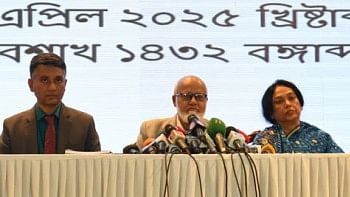Quality in private universities

Photo: Yamin Tauseef Jahangir
Knowledge is the engine of growth for any nation -- be it developing or already developed. "Human capital" has become as important, if not more important, than physical capital in explaining the wealth and poverty of nations around the world.
As Vice-Chancellor of International University of Business Agriculture and Technology (IUBAT) -- I am first and foremost concerned with assuring the success of all universities. I occupy the "upper floors" of the education system. However, I realise that a good building needs a solid foundation.
The foundation of any education system is the primary sector. No country has achieved prosperity without good primary schools able to impart to all children, boys and girls, the ability to read and write, and understand simple mathematics and science. The secondary sector builds on this foundation.
If the foundation is not solid -- if only a minority of children ever master primary school material -- then their performance at secondary and higher secondary levels will inevitably suffer. Many able children will be unable to master the more advanced material taught at this level. Either they will not enter secondary school or, if they do, they will likely drop out.
Finally, all countries require a good number of teachers to succeed at the tertiary level. Why? One obvious reason is that the training of teachers, particularly at the secondary level, requires post-secondary institutions to train them. That is one career path. Developing economies need professionals in many fields: nurses and doctors in the health sector; accountants, engineers, IT experts and trained managers in the business and public sectors.
Since liberation, Bangladesh has invested in public universities but, as all neutral observers have noted, the public universities face many severe problems:
* While the number of private universities has risen, there are still too few compared to other Asian and South Asian countries;
* Unfortunately, the political parties have excessively politicised the country's public universities. Too often, political considerations have influenced hiring of faculty;
* Too often, political activities by students and faculty have disrupted campus life, leading to "session jams" and lengthy delays in students completing their studies;
* The infrastructure of libraries, computer facilities, and labs are often inadequate for good teaching and research;
* In response, many bright students are leaving the country for training abroad. Once abroad, many never return to contribute their knowledge to Bangladesh.
One important response to these problems has been the growth since 1990 of a network of non-government universities. IUBAT has the distinction of being the first non-government university to initiate collaborative programmes in 1991. The number of private universities has grown from a handful in the 1990s, to over 50 at present.
The number of student attending private universities has grown as well. There were about 30,000 at the beginning of this decade; there were 1,82,641 in 2008. There are now slightly more students attending private than public universities (excluding National University and Open University).
Private universities perform a valuable service for the Bangladesh economy. They have dramatically increased the number of places available for students to pursue tertiary education. Unlike public universities -- which receive about Tk.650 crore in annual government funding -- private universities cover costs by relying on students' tuition fees.
While private universities have undeniably benefited the country, they are not perfect. Not only are there legitimate concerns about the quality of public universities, there are also some legitimate concerns about the quality of private universities.
The answer to these concerns is not to subject private universities to an ever-increasing number of government regulations and restrictions. That way lies the danger of red tape, politicisation and stagnation.
The answer is that the private universities must themselves establish a credible system for assuring students and their families, employers and the general public that they are providing quality education. In January 2009, the Association of Private Universities of Bangladesh hosted a conference at IUBAT premises organised by its Committee on Quality Assurance. Among the speakers were Dr. Gholam Kibria, an expert educationist from Delaware State University in the US and Prof. Alex Borland, a quality assurance expert from University of British Columbia, Canada.
I take the liberty of summarising their advice to us on the difficult question of assuring quality by accreditation of private universities. The key requirements of a successful accreditation programme will include the following. The agency must:
* Establish standards for individual courses, academic programmes and universities;
* Establish a competent accreditation (quality-assurance) agency composed of members independent from the universities being evaluated and from the government; (At early stages, this agency should seek advice from similar agencies operating in other countries, and potentially appoint some senior international academics as members.)
* Acknowledge that different universities are at various stages of development and make some allowance in defining standards;
* Advise universities about how to implement the agreed-upon standards;
* Set a time limit on accreditation, thereby requiring universities to be periodically reviewed in order to maintain accreditation.
None of these five requirements will be easy to implement. But if private universities along with public universities are to contribute positively to the social and economic development of Bangladesh we must undertake them to cover all universities in Bangladesh through a unified body.

 For all latest news, follow The Daily Star's Google News channel.
For all latest news, follow The Daily Star's Google News channel. 



Comments